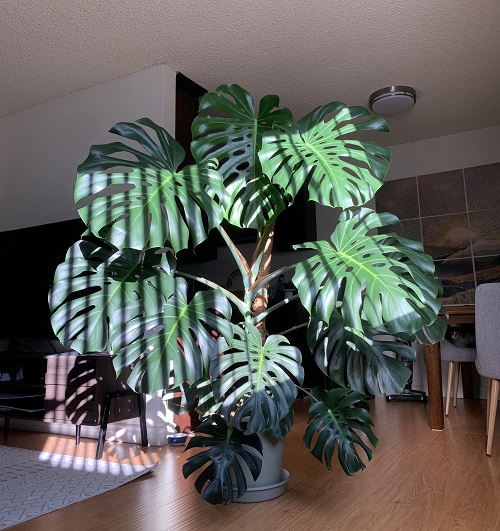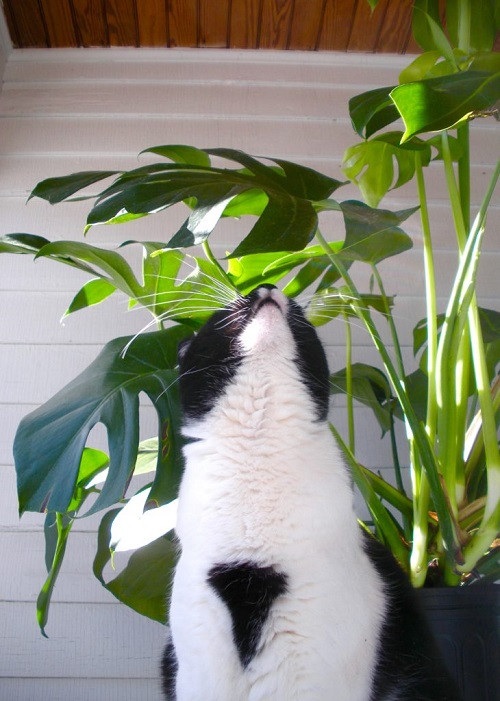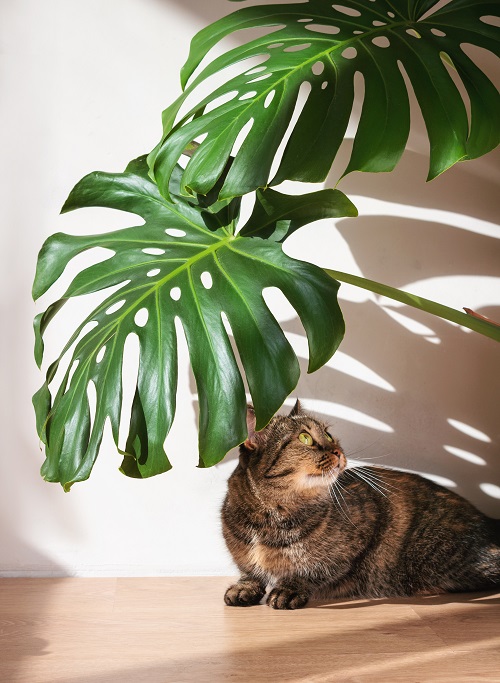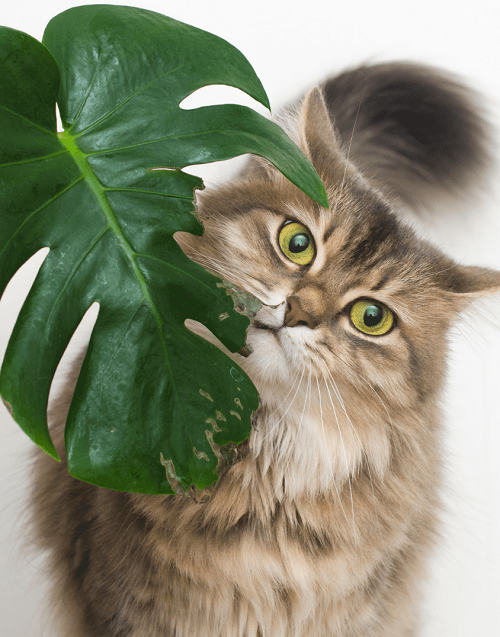Is your lovely Monstera becoming a particularly attractive prey for your feline? That obviously begs the question- Is Monstera Toxic to Cats?
Being a true nature lover, it is no wonder you would have a feline companion in your home alongside the beauty of a Monstera plant. However, you must have seen your kitty getting a little too interested in your Swiss Cheese plant. Maybe it is trying to eat the leaves or chew the stems, and out of concern, you ask yourself—Is Monstera toxic to cats? Well, we have spilled the beans here, so you can find the answer below.
What is Monstera?

Widely loved for its classic “Swiss cheese-style” holes in the leaves and air-purifying qualities, Monstera will instantly become your favorite once you learn about its benefits. It is often a winning choice if you want to bring a slice of the tropics right into your home. Originating from the understory of forests Central American forests, these plants can produce monstrous leaves of about 2-3 feet in the right indoor conditions.
Plus, they have a tendency to climb up any structure, making for aesthetic vertical accents. Thus, it’s hardly surprising that they have become a decor staple indoors.
Is Monstera Toxic To Cats?

Yes, Monstera plants are toxic to cats. The toxicity is not typically lethal unless a cat consumes a substantial amount of the plant, which could cause severe health complications.
The toxic component in Monstera is calcium oxalate crystals, which are present throughout the plant, including in its stems, roots, and leaves. This means that if your cat ingests any part of the plant, it will experience distressing symptoms. Calcium oxalate crystals are essentially small, needle-like structures that are sharp and pointed and that can inflict micro-cuts on the mouth, throat, and digestive tract of a cat, causing irritation and discomfort.
Symptoms Of Monstera Poisoning In Cats
The first sign you would see is your cat pawing at its mouth or face, as calcium oxalate crystals in Monstera cause oral irritation. You might also find distinctive swelling in your cat’s tongue, lips, and mouth. If the case is too extreme and your cat has ingested too much of the plant, it could have a swelling of the threat, making it hard to breathe. In this case, you must get it to a vet immediately.
Other warning signs you may see in your cat are excessive drooling and loss of appetite. A small amount of Monstera plant is not fatal to cats, but larger amounts of calcium oxalate can damage a cat’s kidneys. However, this is quite rarely seen as cats get discouraged from eating large quantities of the plant as soon as they suffer from indigestion or irritation.
TREATMENT AND RECOVERY

If you think your cat might have eaten bits of Monstera, here’s something you can do-
If you have caught your cat eating Monstera, try to remove the plant bits as gently as possible from your pet’s mouth and give it some fresh water to drink. Drinking water can slightly help flush calcium oxalate crystals out of your cat’s digestive system. This should be done while you get in touch with the vet, telling them exactly what happened, your cat’s symptoms, if it’s exhibiting any, and ensuring that you follow their instructions to the T.
It would also be great if you washed your cat’s mouth, paws, or any body part that has come in contact with the plant sap with running water.
If you see symptoms like respiratory issues or breathing troubles or if your cat has collapsed, it is a sign that your cat is extremely sick and needs serious care from a veterinarian. After the vet visit, you must be mindful of your cat and carefully follow the treatment plan.
How To Stop Cats From Eating Monstera and Keep Them Away From Houseplants?

Prevention is always better than cure, and that especially applies to your fur baby’s health. The first thing to do when you bring a new plant home is to check its toxicity to pets. While it is okay to display non-toxic houseplants in the living room or with easy access to your pets, the same cannot be said for Monstera. Besides, eating houseplants is a habit that should be discouraged regarding pets. So, besides choosing pet-safe alternatives in your houseplant collection, here are some steps you can take to keep your cat altogether away from eating plants.
1. Steer your cats away from houseplants with distractions
How do you do that? Well, all you need to do is infuse your cat’s surroundings with catnip, a nepetalactone-rich herb that is irresistible to cats. You could get catnip toys or sprays to capture your cat’s interest, thus mentally stimulating them while distracting them. Besides catnip, you could also get cat balms infused with catnip or similar herbs and watch these be a smash when you rub them on scratching posts and toys.
You could also try planting lemon balm, catnip, and cat grass to keep your cat from getting to your houseplants and encourage them to stick to the safe ones.
2. Use deterrents
Cats hate anything citrus. So spray a little lemon juice diluted with water or vinegar around and on your plant to keep your cat away from messing with your plants. Other repellents can be small amounts of red pepper, mustard, or even bitter apple spray sprayed onto the leaves.
The best option could be to keep rosemary around your houseplants as not only do cats detest the smell of rosemary, but you could also easily use it in your kitchen. To prevent your cat from scratching or digging up your plant, you could try using double-sided tape.
3. Keep your houseplants out of reach
Obviously, the simplest and the most reliable way to keep your cat from getting excessively intrigued by your houseplants like Monstera is to keep them out of reach, like on a higher stand, shelf, or hanging baskets. But this won’t work if your cat is particularly athletic!
So, what you can do instead is either choose a shelf that your cat can’t or doesn’t access by placing them on higher shelves, stands, or bars in your indoor garden area with a gate, chicken wire, or any such barrier.
If your cat has a taste of the outdoors, ensure that you have created a space with pet-friendly plants.
4. Spraying water
This is a great way to disassociate your cat from eating houseplants. When you catch your kitty up to some mischief and trying to eat plants, gently squirt some water, thus training your cat to associate plants with undesired consequences. Not only is this method quite effective, but it is also completely safe.
Even if your cat shows a little too much interest in houseplants like Monstera, you can try this method, and soon, they will learn to avoid that area.
5. Providing a Distraction
When cats are bored, they generally resort to behaviors like eating houseplants. To discourage this behavior and give them mental stimulation, you should provide them with various toys and visual stimulation like “kitty TV” videos or bird feeders. Kitty videos can be easily found on YouTube for free.
If you want to go a little extra, you could also provide your cat with tunnels and cat trees for them to explore and hide in. It is crucial that your furry companion gets enough playtime and attention from you, without which they may show negative behaviors.
6. Cat-Safe Plants
If nothing seems to work, just opt for these pet-safe houseplants so you can be worry-free about your pet and not give up on your gardening hobby! Several plants are easy to take care of and look exquisite indoors, and also ones that are cat-safe, such as the Spider plant, Ponytail palm, Burro’s tail, Christmas cactus, cast iron plant, among others.
7. Bonus Tips!
Train your cat not to go near your plants by gently saying “No” and rewarding them profusely with treats and affection when they follow through. Oftentimes, it might happen that your cat does not eat your houseplants but shows behavioral issues like using the houseplant pots as a litter box. This could indicate that your cat does not prefer their own litter box. Consider switching out the type of litter and make it clean and fresh so your cat doesn’t hate it.
You could also discourage digging behaviors or prevent your cat from walking all over the houseplant pots by mulching the topsoil with rocks, aluminum foil, pine cones, stones, etc. These act as barriers to prevent your mischievous kitty from digging up soil, as they tend to hate the feeling of such substances in their paws.






